Let’s find out what is our greatest asset and how we can take care of it! – Our Own Inmune System
What is it? How does it work and how can we boost the inmune system? Let’s Eat the Food that Supports a Healthy Inmune System.
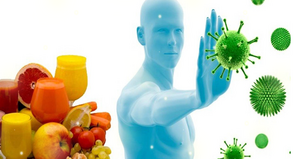
The Inmune system is a complex network of cells, organs, and tissues that work together to defend the body from microorganisms and toxic substances that cause disease: fungi, parasites, viruses, and bacteria.
Here are the components of the Immune System:
• Adenoids. Two glands located at the back of the nasal passage.find out what is
• Bone marrow. The soft, spongy tissue found in bone cavities.
• Lymph nodes. Small, bean-shaped organs found throughout the body and connected through lymphatic vessels.
• Lymphatic vessels. A network of channels throughout the body that carry lymphocytes to the lymphoid organs and the bloodstream.
• Peyer’s patches. Lymphatic tissue in the small intestine.
• Spleen. A fist-sized organ located in the abdominal cavity.
• Thymus. Two lobes that meet in front of the trachea, behind the sternum.
• Tonsils. Two oval masses in the back of the throat.
Practically, what the immune system does is monitor and detect anything that can harm the body, such as viruses, bacteria or other agents. Once it recognizes it, it activates a response mechanism to attack it.
For example, the first line of defense is carried out when a bacterium enters, the body temperature of that area, in particular, is increased so that they do not reproduce. Lymphocytes and phagocytes are responsible for attacking these microorganisms. Here the organism begins to generate the “immunological memory” which remembers said virus. Thus, when it returns, it can be attacked faster.
Having a strong and well-regulated immune system is one of the key elements to enjoying optimal health. Our lifestyle conditions our health and immune system.
Food, stress, the consumption of alcohol, tobacco, sleep regulation, emotional state and the practice of physical exercise are key to improving our health, because from a comprehensive perspective all of them condition the continuous recharge of the immune system.

Therefore, the goal of each one of us is to reach the state of homeostasis, which is exactly to achieve the balance of the internal environment of our body. And for this we need to live in accordance with nature and in harmony with the planet. In summary:
1. Let’s eat in a healthy way based on the intake of plant foods (hopefully, consuming plant foods most of the time or at least more than three times a week) and put aside processed and refined products that is, we consume whole plant grains and not processed food;
2. Let’s sleep respecting our circadian rhythms (circadian rhythm related to light is sleeping at night and being awake during the day);
3. Let’s increase physical activity on a regular basis;
4. Let’s manage stress;
5. Let’s avoid being exposed to toxic and environmental pollution,
6. And let’s live in peace with ourselves and our people around us. In this way we will achieve the maintenance of homeostasis and ensure that our immune system is in an optimal state.
Without a doubt, replicating this lifestyle is not easy given the living conditions that each person has, but we must work towards improving our living conditions as much as possible, and as key pieces are to protect our environment and live in the maximum possible coherence with our planet. So, what is the first step? Let’s start by generating individual awareness or self-consciousness and working each one of us towards the ideal “integral health”. Let’s understand that our health is our commitment and at the same time it is our own responsibility.
1. BALANCED NUTRITION:
Our bodies need vitamins to function properly, and the best way to get vitamins is by eating a wide variety of healthy foods. Here are some of the vitamins and nutrients that protect our immune system and where we can find them.
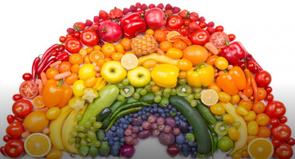
Vitamin C – Repairs red blood cells, bone and muscle tissues, helps wound healing and helps the inmune system fight disease. In addition, Vitamin C protects cells from damage caused by free radicals that are harmful components found in polluted air, UVA rays from the sun and cigarette smoke. And, it is also vital for collagen production.
We will find it in citrus fruits such as oranges, grapefruits and tangerines and other fruits such as kiwi, strawberries, guavas, papaya, mango and vegetables such as tomato, peppers, broccoli, and cabagge.
Vitamin A – It works by protecting the mucous membranes of the digestive and respiratory systems, in addition to stimulating the functioning of the inmune system. It also participates in the formation and regeneration of healthier, younger and cleaner skin, improves eyesight, and prevents anemia at any age. In case of deficit, the cells’ ability to defend ourselves fails. Foods rich in vitamin A and beta carotene are:
• If we choose the animal kingdom, we have beef, chicken or turkey, fish and shellfish. Likewise, butter, milk, or chesse and eggs are also part of foods rich in vitamin A.
• And, If we opt for the plant kingdom, choose papaya, melon, apricot and mango. In vegetables choose sweet potatoes, squash or pumpkin, carrots, broccoli, cabbage and spinach and in general all legumes such as beans, chickpeas, fava beans, and lentils.
Vitamin B6 – In case of deficit there is a decrease in white blood cells and an altered response. Where can we find this vitamin?
• If we choose the animal kingdom, we will find it in tuna, salmon, beef, pork and poultry.
• And if we choose the plant kingdom, choose bananas, legumes in general, nuts, and whole grains.
Vitamin B12 – With levels below normal, there is a decrease in defense cells.
• If we choose the animal kingdom, we will find it naturally in foods of animal origin, such as fish, meat, poultry, eggs, milk and dairy products.
• And if we choose the plant kingdom, choose whole grains, kale, tempeth, miso. Be aware, Vitamin B12 is generally not present in plant foods.

Vitamin D – Studies have shown a relationship between the deficiency of this vitamin and the incidence of respiratory infections. If we are deficient in this vitamin this could increase our risk of upper tract infections, including the flu and allergic asthma. Since vitamin D works against inflammation, it can help those who suffer from arthritis or autoimmune diseases such as lupus, psoriasis, or irritable bowel syndrome. We find our vitamin D by:
• If we choose the animal kingdom, eat fatty fish such as salmon, sardines and anchovies (in moderation), eggs, especially the yolk (no more than one a day)
• And if we choose the plant kingdom, consume mushrooms, this is one of the few vegetables that concentrate this vitamin, such as cremini or brown mushrooms, portobello and maitake.
• Sun! Let’s spend at least 30 minutes in the sun every day with light or uncovered clothing, to produce vitamin D. Make sure you use sunscreen, and protect your eyes. In the event that you cannot do it, you should evaluate the taking of a supplement according to your requirements by age and sex.
Vitamin E – A lower consumption deteriorates our immune capacity, since this vitamin protects us from infections. Almonds, due to their high content of vitamin E and manganese, ideal for strengthening the immune system; and walnuts, rich in omega-3s, which help reduce the risk of respiratory infections.
• If we choose the animal kingdom, we will find it in fish and it is a healthier option than the other sources. And to a lesser extent, in eggs and all products of animal origin.
• And if we choose the plant kingdom, let’s eat nuts like almonds, hazelnuts, pine nuts, peanuts, and pistachios. Of the fruits, kiwi has the highest concentration of vitamin E. Vegetables such as avocado, spinach and broccoli also have Vitamin E. However, vitamin E is present in high concentrations in all vegetable oils – sunflower, rapeseed, olive. Be careful, the oils are not so healthy since when extracting the oil of their origin (sunflower, olive, etc.) they simply extract the oil and the nutrition remains in the olive and in the nuts or seeds from which they extract the oils.
Zinc – It is necessary for the development of cells of the immune system; If we don’t get enough, we could be at higher risk for pneumonia and other respiratory infections. Some studies have shown that taking zinc early in an illness can help us heal faster. We can obtain a healthy amount of zinc by:
• If we choose the animal kingdom, eat normal servings of low-fat meat, seafood, low-fat dairy, eggs, and chicken.
• And if we choose the plant kingdom, let’s consume nuts such as almonds or hazelnuts, seeds, dried fruits, oats. tofu, beans, and lentils (legumes in general)
Iron – Essential for the proper functioning of the immune system. If its levels are below the recommended, the defense capacity of the white blood cells decreases.
• If we choose the animal kingdom, we will find it in meats; the egg yolk.
• And if we choose the plant kingdom, choose whole grains and legumes for their high protein, mineral and fiber content such as lima beans, beans, lentils, and chickpeas and spinach. It should be accompanied with the consumption of citrus fruits, to promote its absorption.
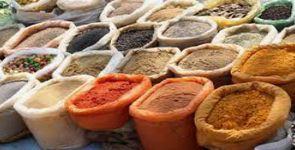
Spices – have been used as medicine and in alternative treatment for centuries, and many have been put to the test by modern science. These are some of the delicious spices that, used in moderate amounts, can help protect our cells: turmeric, ginger, cayenne pepper, cinnamon, garlic, onion, and oregano.
Increasing Omega-3 fatty acids. Omega-3 fatty acids, such as DHA and EPA, are healthy types of fat that enhance the functions of immune cells, which play an important role in the immune system. We can find them in:
• If we choose the animal kingdom: mackerel (4,107 mg per serving), salmon (4,123 mg per serving), cod liver oil (2,682 mg per serving), herring (946 mg per serving), oysters (370 mg per serving) sardines (2,205 mg per serving), anchovies (951 mg per serving), caviar (1,086 mg per serving)
• And if we choose the kingdom of plant foods, there is some omega 3 in chia seeds, flaxseeds, walnuts and I do supplement fish oil in capsules.
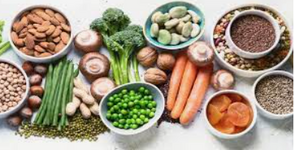
Eat more whole, plant-based foods. Whole plant-based foods like fruits, vegetables, nuts, seeds, and legumes are rich in nutrients and antioxidants that can give you an edge against harmful pathogens. The antioxidants in these foods help decrease inflammation by fighting unstable compounds called free radicals, which can cause inflammation when they accumulate in your body at high levels. Chronic inflammation is linked to numerous health conditions, including heart disease, Alzheimer’s, and certain types of cancer.
Meanwhile, the fiber in plant foods fuels your gut microbiome, or the community of healthy bacteria in your gut. A resistant gut microbiome can enhance your immunity and help prevent harmful pathogens from entering your body through your digestive tract. Also, fruits and vegetables are rich in nutrients like vitamin C, which can reduce the duration of the common cold.
AND LASTLY AND I CONSIDER THE MOST IMPORTANT SUGGESTION, LET’S FOCUS ON INTESTINAL HEALTH WITH PREBIOTICS AND PROBIOTICS
The digestive system plays a central role in supporting our immune function. The intestinal tract is the main route of contact with the external environment and is a pathway that contains microbiomes that aid digestion, as well as the absorption of nutrients. Having the correct gut bacteria has been associated with benefits such as weight loss, better digestion, healthier skin, and most importantly, optimal immune function.
What is the difference between PRObiotics and PREbiotics?
The fundamental difference between the two is that probiotics are live microorganisms that, when administered in adequate amounts, confer a benefit to our health; While prebiotics are foods that support the microbiome and stimulate the growth or activity of microorganisms. If we get the microbiome to have the necessary nutrients (especially soluble fiber) and if we help it with probiotics from various strains and from different sources, then we boost our immune system to another level that is more beneficial to our health.
Among the PREBIOTIC foods are: Artichokes, chicory and banana: they contain inulin, a natural prebiotic. There are also prebiotics in legumes, potatoes, sweet potatoes, garlic, onions, leeks, wheat, oats, and barley.
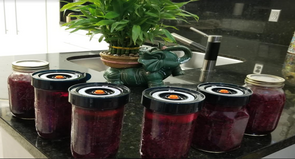
Among the PROBIOTIC foods we have: Kombucha, green juices made with kombucha scobys, kombucha muffins, dark chocolate made with kombucha scobys. Yogurt (hopefully plant), kefir, tempeth, kimchi, tofu, miso, fermented vegetables (these fermented foods offer natural probiotics (called “good bacteria”) that inhabit the digestive tract. These support immune health by counteracting other bacteria that could make us sick, and of course, there are encapsulated probiotics that can be bought in the store.
2. EXERCISE: Regular exercise, especially CARDIOVASCULAR exercise, strengthens the cells of our immune system and reduces inflammation so that our body uses its defenses to fight infection. Other benefits of exercise include lowering the risk of heart disease and type 2 diabetes, reducing stress, keeping our brain alert, and reducing the risk of developing Alzheimer’s.
3. SLEEP WELL: Not getting enough sleep can cause illness, and poor sleep is also linked to weight gain, high blood pressure, and depression. Bedtime is your body’s time to repair itself, and that includes the production of T cells that help fight infection. To help your body and mind perform at their best, let’s try to get 7 to 8 hours of solid, uninterrupted sleep. Sleep and immunity are closely related. In fact, poor sleep or poor quality sleep is linked to increased susceptibility to the disease.
In a study of 164 healthy adults, those who slept less than 6 hours each night were more likely to get colds than those who slept 6 hours or more each night. Getting plenty of rest can strengthen our natural immunity. In addition, we can sleep more when we are sick to allow our immune system to better fight the disease.
Adults should aim for 7 or more hours of sleep each night, while adolescents need 8-10 hours, and younger children and babies up to 14 hours.
If you have trouble sleeping, try limiting screen time for an hour before bed, as the blue light emitted by your phone, TV, and computer can disrupt your circadian rhythm or your body’s natural wake-sleep cycle. Other tips for sleep hygiene include sleeping in a completely dark room or wearing a sleep mask, going to bed at the same time each night, and exercising regularly
3. DON’T WORRY: Stress is bad for both our body and our mind. Too much stress over a long period of time suppresses our immunity and floods our body with cortisol, which can attack our white blood cells and make us less able to fight a number of diseases, including cancer. Regular self-care, including exercise, can help us cope better with stress.
4. BE HAPPY: We know that stress and loneliness can make us sicker. Although there is no solid evidence that happiness strengthens our immunity, being happy is related to healthy habits, such as eating more fruits and increasing physical activity. Happiness is also linked to a lower risk of heart disease, and it has a positive impact on our perception of pain.

5. LIMIT ADDED SUGARS: New research suggests that added sugars and refined carbohydrates may contribute disproportionately to overweight and obesity.
Obesity can also increase our risk of getting sick. According to an observational study of about 1,000 people, obese people who got the flu shot were twice as likely to get the flu as non-obese people who got it.
Cutting back on sugar can decrease inflammation and help us lose weight, thereby reducing our risk of chronic diseases like type 2 diabetes and heart disease. Since obesity, type 2 diabetes, and heart disease can weaken the immune system, limiting added sugars is an important part of a diet that strengthens the immune system. We need to limit our sugar intake to less than 5 percent of our daily calories. This equates to about 2 tablespoons (25 grams) of sugar for someone on a 2,000-calorie diet.
7. STAY HYDRATED: Hydration does not necessarily protect you from germs and viruses, preventing dehydration is important for your overall health. Dehydration can cause headaches and impair physical performance, concentration, mood, digestion, and heart and kidney function. These complications can increase your susceptibility to getting sick. The formula is to divide your weight in pounds in half and that is the amount of water you should drink in ounces. I weigh 100 pounds so half is 50 and my water intake should be 50 ounces or 7 bottles (8oz each).
While tea and juice are also hydrating, it is best to limit fruit juice and sweetened tea due to their high sugar content.
IN CONCLUSION: We can make several changes to our lifestyle and diet to strengthen our immune system. These include reducing our sugar intake, staying hydrated, exercising regularly, getting a good night’s sleep, and managing our stress levels. Remember our health is our commitment and at the same time it is our responsibility.
References
- Jennewein, M. F., Abu-Raya, B., Jiang, Y., Alter, G., & Marchant, A. (2017, November). Transfer of maternal immunity and programming of the newborn immune system. In Seminars in immunopathology (Vol. 39, No. 6, pp. 605-613). Springer Berlin Heidelberg.
- Bezirtzoglou, E., & Stavropoulou, E. (2011). Immunology and probiotic impact of the newborn and young children intestinal microflora. Anaerobe, 17(6), 369-374.
- Parracho, H., McCartney, A. L., & Gibson, G. R. (2007). Probiotics and prebiotics in infant nutrition. Proceedings of the Nutrition Society, 66(3), 405-411.
- Adams, J. S., Liu, P. T., Chun, R., Modlin, R. L., & Hewison, M. (2007). Vitamin D in defense of the human immune response. Annals of the New York Academy of Sciences, 1117(1), 94-105.
- Dardenne, M. (2002). Zinc and immune function. European journal of clinical nutrition, 56(3), S20-S23.
- Johnson, E. E., & Wessling-Resnick, M. (2012). Iron metabolism and the innate immune response to infection. Microbes and infection, 14(3), 207-216.
- Carr, A. C., & Maggini, S. (2017). Vitamin C and immune function. Nutrients, 9(11), 1211.


